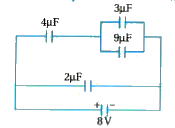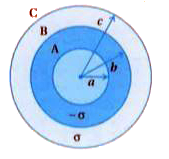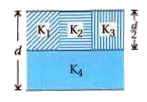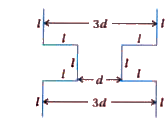Complete Solutions to Section D ( MCQs asked in Cometitive Exams ) of chapter ELECTROSTATIC POTENTIAL AND CAPACITANCE of Class 12 book with complete answers and questions
| Class 12 | PHYSICS |
| Chapter | ELECTROSTATIC POTENTIAL AND CAPACITANCE |
| KUMAR PRAKASHAN | Section D ( MCQs asked in Cometitive Exams ) |
| Number Of Questions | 39 |
| Academic Year | 2023-24 |
Capacitance of a capacitor 100 `mu` F. The work is done for depositing chargc `8 xx 10^(-18)` C on it will be .........
View SolutionA fully charged capacitor has a capacitance· C. It is discharged through a small ,coil of - resistance wire embedded in a thermally insulated block of specific heat capacity s and mass. If the temperature of the block is raised by `Delta`T, the potential difference V across the capacitance is ...... .
View SolutionTwo insulating plates arc both uniformly charged in such a way that the potential difference between them is `V_(2) - V_(1)` = 20V (i.e. plate 2 is at a higher potential). The plate are separated by d = 0.1m and can be treated as infinitely large. An electron is released from rest on the inner surface of plate 1. What is its speed when it hits plate 2 ?
`(e = 1.6xx10^(-19) C m_(e)= 9.11xx10^(-31)` kg )
View SolutionAn electric charge `10^(-3) muC` is placed at the origin (0, 0) of X-Y co-ordinate system. Two points is A and B are situated at `(sqrt(2),sqrt(2))` and (2, 0) respectively. The potential difference between the points A and B ,will be ......
View SolutionA battery is used to charge a parallel plate capacitor till the potential difference between the plates become equal to the electromotive force of the battery. The ratio of the energy stored in the capacitor and the work clone by the battery will be .......
View SolutionPotentials of points P and Q are 10 V and - 4 V respectively. Work done in taking 100 electrons from P to Q ........
View SolutionTwo capacitors `C_(1)` and `C_(2)` are charged to 120 V and 200 V respectively. It is found that by connecting them together the potential on each one can be made zero. Then
View SolutionA parallel plate capacitor is made of two circular plates separated by a distanc of 5mm and with a dielectric of dielectric constant 2.2 between them . When the electric field in the dielectric is `3xx10^(4)`V/m the charge density of the positive plate will be close to :
View SolutionAssum that an electric field `vecE = 30 x^(2) hati `exists in space. Then the potential difference `V_(A) - V_(0)`, where `V_(0)` the potential at the origin and `V_(A)` the potential at x = 2 m is :
View SolutionA combination of capacitors is set up as shown in the figure. The magnitude of the electric field, due of a point charge Q (having a charge equal to the sum of the charges on the 4 `mu`F and 9 `mu`F capacitors), at a point distant 30 m from it, would equal :

View SolutionAn electrical technician requires a capacitance,of 2 `muF ` in a circuit across a potential difference of 1 kV. A large number of ` 1 muF` capacitors are available to him each of which can withstand a potential difference of more than 400 V. Suggest a possible arrangement that requires the minimum number of capacitors .
View SolutionConsider A, D and C to be the co-centric shells of metal . Their radii are a ,b and c respectively (a < b < c). Their surface charge densities are `sigma, -sigma` and `sigma` respectively. Calculate the electric potential on the surface of shell A.

View SolutionA parallel plate capacitor of capacitance 90 pF is connected to a battery of emf 20 V. If a dielectric material of dielectric constant `K =(5)/(3)` is inserted between the plates the magnitude of the charge will be :
View SolutionA 60 pF capacitor is fully charged by a 20 V supply. It is then disconnected from the supply and is connected to another uncharged 60 pF capacitor in parallel. The electrostatic energy that is lost in this process by the time the charge is redistributed between them is ( in nJ)
View SolutionIf two capacitors `C_(1)` and `C_(2)` are connected in a parallel combination then the equivalent capacitance is `10 mu F `. If both the capacitors are connected across a l V battery, then energy stored in `C_(2)` is 4 times of that in `C_(1)`. The equivalent capacitance if they are connected in series is
View Solutionlf the electric field around a surface is given by
`|vecE|=(Q)/(E_(0)|vecA|)` where `vecA` is the normal area of surface and `Q_("in")` is the charge enclosed by the surface. This relation of Gauss's law is valid when
View SolutionA parallel plate air capacitor of capacitance C is connected to a cell o f emf V and then disconnected from it. A dielectric slab of dielectric constant K, which can just fill the air gap of the capacitor, is now inserted in it. Which of the following is incorrect?
View SolutionA parallel plate air capacitor has capacity 'C' distance of separation between plates is 'd' and potential difference 'V' is applied between the plates force of attraction between the plates of the parallel plate air capacitor is :
View SolutionIn a certain region, the electric potential is given by the formula V(x ,y, z) = 6xy - y + 2yz Find the components of electric field and the vector electric field at point (1, 1, 0) in this field. Find the vector of electric at (1, 1, 0).
View SolutionA capacitor of 2 `mu`F is charged as shown in the diagram . When the switch S is turned to position 2, the percentage of its stored energy dissipated is

View SolutionA parallel-plate capacitor of area A, plate separation d and capacitance C is filled with four dielectric ,materials having dielectric constants `K_(1) , K_(2), K_(3)` and `K_(4)` as shown in the figure below. If a single dielectric material is to be used to have the same capacitance C in this capacitor, then its dielectric constant K is given by

View SolutionA molecule of a substance has permanent dipole moment p. A mole of this substance is polarised by applying a strong electrostatic field E. The direction of the field is suddenly changed by an angle of `60^(@)`. If N is the Avogadro's nwnber the amount of work done by the field is ......
View SolutionA parallel plate capacitor is to be designed using a dielectric of dielectric constant 5, so as to have a dielectric strength of `10^(9) Vm^(-1)`. If the voltage rating of the capacitor is 12 kV, the minimum area of each plate required to have a capacitance of 80 pF is .........
View SolutionA wheel having mass m has charges + q and - q on diametrically opposite points. It remains in equilibrium on a rough inclined plane in the presence of a vertical electric field E. Then value of E is ......

View SolutionQ amount of electric charge is present on the surface of a sphere having radius R. Calculate the total energy of the system.
View SolutionCharges `1 mu `c are placed at each of the four corners of a square of side `2sqrt(2)` m. The potential at the point of Intersection of the diagonals is ...... (K = `9 xx 10^(9)` SI unit)
View SolutionEnergy of a charged capacitor is U. Now it is. removed from the battery and then it is connected to another uncharged capacitor having the capacitance twice the first one In parallel. The energy of first and second capacitors respectively is ......
View SolutionThe dimensional formula of capacitance ls ...... Take Q as the dimension formula of charge.
View SolutionA uniform electric field is prevailing in X- direction in certain region. The Co-ordinates of points P, Q and R are (0, 0), (2, 0), (0, 2) respectively which of the following alternatives is true for the potentials at these points ?
View SolutionAn electric dipole of dipole moment `vecP` is placed parallel to the uniform electric field of intensity `vecE.` On rotating it through `180^(@)` the amount of work done is ..... .
View SolutionTen identical square metallic plates are arranged as shown in figure. Length of each plate is l. The equivalent capacitance of this arrangement would be ........ .

View SolutionOn the axis and on the equator of an electric dipole for all points .......... .
View SolutionThe unit of polarizabity of the molecule is .........
View SolutionThe unit of Intensity of polarization is ........
View SolutionIn the figure area of each plate is A and the distance between consecutive plates is as shown in the figure. What is the effective capacitance between points A & B.

(a) `(Aepsilon_(0))/(d)`
(b) `(3A epsilon_(0))/(d)`
(c) `(2A epsilon_(0))/(d)`
(d) `(4 A epsilon_(0))/(d)`
View SolutionA moving positive charge approaches a negative charge. What will happen to the potential energy of the system?
View SolutionValue of dielectric strength for air is ...... `Vm^(-1)`
View SolutionThree capacitors of 2 pF, 3 pF and 4 pF are connected in parallel. What is the total capacitance of a network ?
View SolutionEquipotential surface through a point is ...... to the electric field at that point.
View Solution
Section D ( MCQs asked in Cometitive Exams ) questions and complete solutions for chapter ELECTROSTATIC POTENTIAL AND CAPACITANCE of KUMAR PRAKASHAN KENDRA PHYSICS (GUJRATI ENGLISH) of Class 12
All Exercises from KUMAR PRAKASHAN Class 12 PHYSICS ELECTROSTATIC POTENTIAL AND CAPACITANCE
- ( Section -A) Try Yourself
- ( Section -A) Questions - Answers
- Section B (questions)
- Section B ( Numerical From DARPAN. Based on Textbook )
- Section B ( Numerical From Textual Exercise )
- Section B Numericals
- Section C ( NCERT Exemplar Solution ) ( Long Answer Type Questions )
- Section C ( NCERT Exemplar Solution ) ( Multiple Choice Questions (MCQs ) )
- Section C ( NCERT Exemplar Solution ) ( Very Short ,Aswer Type Questions )
- Section C ( NCERT Exemplar Solution ) (Short ,Aswer Type Questions )
- Section D ( MCQs asked in Cometitive Exams )
- Section D ( Multiple Choice Questions (MCQs) )